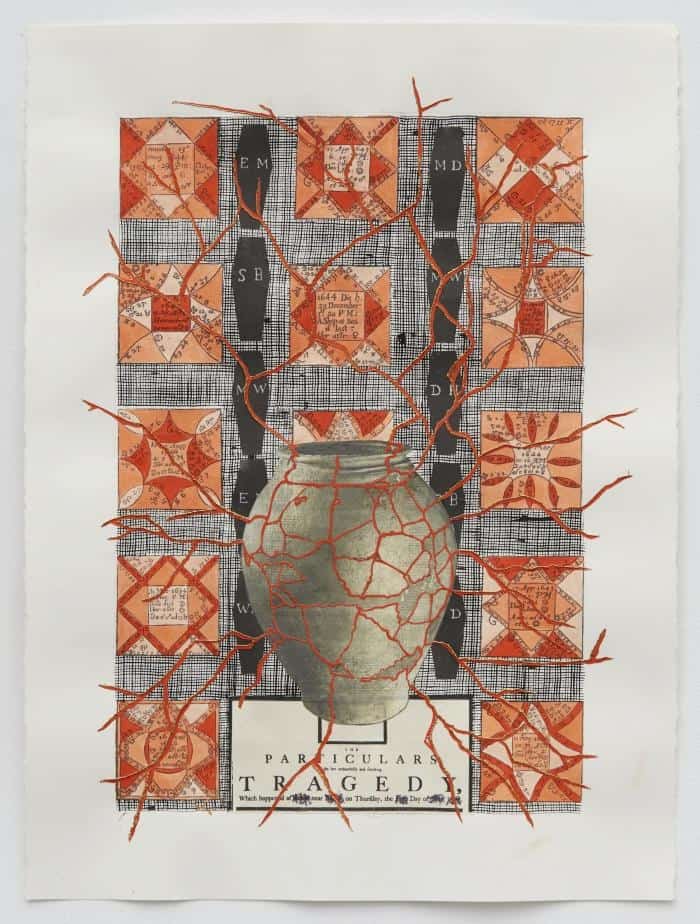The artist Nancy Bowen has been showing politically attuned sculpture and drawings since the early 80s. Her exhibition, For Each Ecstatic Instant, is on display at Kentler International Drawing Space through Oct 28.
Taking its title from an Emily Dickinson poem – “For each ecstatic instant/ we must an anguish pay/ in keen and quivering ratio/ to the ecstasy”—it occupies the main gallery space of Kentler. The smaller area that you first walk into features selected pieces from The Kentler Flatfiles curated by Bowen, including work from Pauline Galiana and Viviane Rombaldi Seppey.
This is an uneven exhibition, with some pretty obvious pieces, but others that smashingly hit their goal, as critic Sarah Sentilles puts it in the exhibition’s featured essay, of raising “questions about what counts as knowledge…who has authority to name and label and dissect…who gets to decide which game we’re playing and whose rules we should follow.”
Walking around the 14 selected pieces, Bowen gives an abridged view of human history of men effectively erasing women. It starts with “American Vessels,” with curious woven patterns and an embryo-like figure at the forefront in millennial pink. Here, as elsewhere, Bowen selects 18th-century drawings of cutlery, pots, and idealistic rendering of Greek vases and olive trees. It appears to be a stand-in for female psyches before overtly masculine presences could smash the pot and reconfigure it for their own profit and mastery.
After references to Pythagoras (“Pitagoras” in the spelling of yore) and odd German folklore, the near annihilation of those prelapsarian vessels is reached with “The Particulars of our Tragedy.” Crimson streaks crack parasitically through a classical vase that, judging from the font near the bottom, belonged to an Elizabethan play. It may also be a shout out to Aristotelean notions of drama. Either way, the effect is stirring and tragic in its inevitability. You sense the vase is bounded by nefarious forces, that like the House of Atreus, it’s simply cursed.
The focal point of the exhibit, the installation “For Each Ecstatic Instant,” is a bit of a let down in person. It’s unfocused, referencing pyramids, constellations, Saint Catherine broken on the spinning wheel and more neoclassical drawings of vases and olive trees, which the gallery says is a magnified rubbing of one of her ancestral gravestones.
Bowen may have taken on too much here; looking at this installation, the audience is situated nowhere. The bulbs and wires aren’t arranged to conceal their Michael’s quality, which is worrisome when the asking price for these pieces range from $1,500 to $6,000.
The second half of the exhibition hits its stride. “52 Great American Personalities with Kali’s Tongues” balances Bowen’s goal of shedding the political secrets of the past through the present consciousness of MeToo. On a found book listing the biographies of 52 “great American” personalities – all male – she paints over some aspects of their biographies, and keeps their short biography near a Kali tongue, the Hindu goddess who destroys evil. That Kali’s tongue looms near to these unquestioned luminaries makes one wonder what of their actions never hit the history books. This piece compellingly calls you to reexamine the past. With acute awareness, it forces one to pay attention to the obscured bits of biography behind great men, to place quotes over “founding fathers.”
The one female that finally starts to emerge in For Each Ecstatic Instant is Marie Curie, included on Isaac Asimov’s list of over 539 eminent scientists. She’s clocking in at 364. Also, near the end is the artists’ book, “What’s New Pussycat?” cheekily placed on a pedestal.
The exhibition is the rare one with a cohesive ending. In the final piece, “Providence,” Bowen painted the vase and olive tree motif onto a map of Providence, RI. The tint isn’t sexual, but subdued and self-possessed, as it was in “American Vessels.” For Each Ecstatic Instant then comes full circle, reaching some solace after the longest of struggles possible.










